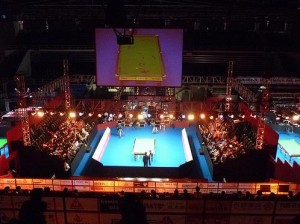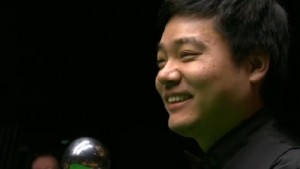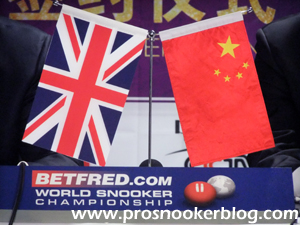
Since starting this blog, one thing that I have come to understand is just how global snooker has now become as a sport. One particular evening in the Crucible media room earlier this year for example, I recall a conversation involving people from England, Belgium, Latvia, China and Ireland.
It is something that for those of us from England in particular is easy to ignore and therefore in a series of articles coming up over the coming weeks and months, I plan to take a look at particular countries, talking to experts from them and hoping to shed a little light on how big snooker is across the world.
First up, I take a look at the relationship between snooker and China, a country that is clearly now central to snooker’s future…
If you ask most people about the rise of snooker in China, no doubt most would cite the victory of then wildcard player Ding Junhui at the 2005 China Open as being the catalyst.
In reality however, snooker’s roots in China can be traced back to 1986, when with Barry Hearn’s Matchroom Mob at its peak, he took Steve Davis, Terry Griffiths and Dennis Taylor to Shanghai for the invitational China Masters event, which you will not be surprised to learn was won by Davis.
The first ranking event to be held in China was the 1990 Asian Open (which again you will not be surprised to know was won by Stephen Hendry), before snooker returned to the country at the end of the decade, with further events in Shanghai and Shenzhen.
With the various political and financial wars ongoing within the game at the time, there was to be a three-year absence of ranking event snooker in China, before the tournament was revived in 2005, in the form of the China Open, held in Beijing.
And of course we all know what happened next. 18-year-old wildcard Ding Junhui was to come through the field, defeating the likes of Peter Ebdon, Marco Fu, Ken Doherty and finally seven-times world champion Stephen Hendry 9-5 to capture his home title.

Since then, on a personal level Ding has gone on to establish himself as clearly the best player ever to have come from China, winning six full-ranking event titles, as well as the prestigious Masters tournament at the Wembley Arena.
His break-building ability is right up there with the greats such as Stephen Hendry and Ronnie O’Sullivan, and at his present rate it is not inconceivable that he could one day surpass both of those great players in both the century and maximum break tallies.
On a wider level however, it is the impact of Ding’s success generally that has been most extraordinary, as that 2005 victory sparked the start of a snooker boom, which over the past eight years has transformed the entire snooker circuit.
During the 2013/14 season, we will see five full ranking events staged in China, in addition to four Asian Tour events, which will provide the best performers with a route to both the PTC Grand Finals and the main tour for the following two years. While there are other nations that are enthusiastic about snooker, in terms of financial backing and commitment to tournaments, few come close to the level demonstrated by China.
At the time of writing there are 15 main tour professionals from China, surely a record figure, while next year there will be another following Lu Ning’s victory at the 2013 IBSF World U-21 Championship earlier this summer.

Despite all of that however, I cannot help but feel sometimes that there is a certain negativity exhibited from some directions about the growth of snooker in China and its status within the game.
The obvious complaints concern the crowd levels in China, as well as their etiquette and in particular the amount of mobile telephones and camera flashes that you see at the events in the Far East.
Another highly contentious point is of course the continued presence of wildcards in Chinese events, which albeit reduced this season in comparison to previous years, fly in the face of the message of fairness that the governing body are looking to send out.
Is such criticism fair? Is snooker really as important to China as the media and those governing the sport would have us believe, or has the so-called snooker boom been overplayed?
As someone who has never been abroad, let alone to China, I have found it very difficult to accurately gauge the level of interest that there is there. We hear and see photographs of the players being mobbed by fans whilst walking along red carpets and so on, but then we also see the empty arenas, largely devoid of atmosphere, which to those of us in England at least, gives a different impression.
This year at the World Championship however, I had the pleasure of meeting Nerissa Wang of leading Chinese snooker website my147.com and spending time with her helped to give me a real insight into the level of interest among the Chinese.

As I mentioned at the time, she also gave me a copy of the ‘ibiliiard’ magazine, which even without being able to read, is clearly of some production quality and something akin to magazines that we might have over in England to cover bigger sports such as football and even non-sporting lifestyle magazines.
To try and help further understand the importance of snooker in China, I spoke to Nerissa recently to ask her about her role with my147 and for her impressions of snooker there…
PSB: Hi Nerissa, to begin, can you remember when you first watched snooker and why you like snooker?
Nerissa Wang: Yes, I was very impressed watching Ding Junhui watch the 2005 China Open and from then on I began to see snooker and fall in love with it.
PSB: You work for ibilliard/my147.com – what do you do? How long have you been doing it? Is the magazine specialist or aimed at the general public?
NW: My role is to provide updated snooker news for ibilliard/my147.com. My major at university is toursiam management and I later decided to choose a work direction that I like, so i began a part-time journalist and become a full time after university.
The ibilliard magazine is aimed aim at both specialist snooker fans and also the general public. We have columns, teaching classes for snooker enthusiasts and also entertainment informations, for example an actress will tell us her billiards story and take some art photos for us.
PSB: How popular is the website/magazine? Are there many snooker magazines in China?
NW: Our website started in 2005 and is now the biggest website in China. We have been the official website for many events, including the Women’s 9-ball championship、 9-ball China Open and so on.
Our magazine was first published on 25th March 2013 and has since become more and more popular and influential.
![]()
PSB: Who are the most popular sportsmen in China generally? Why?
NW: Ding Junhui for sure.
Ding and other two sportsmen named Yao Ming (basketball player) and Liu Xiang (hurdle race player), who represent China’s sports spirit: to be more accurate, higher and faster.
PSB: How big would you say that snooker is in China? Both in terms of participation and viewing in comparison to other sports? What is it about snooker that makes it so popular in China?
NW: In certain provinces of China like Guangdong province, snooker is very popular.
But as I see, there are not a lot of people who play snooker for fun. Chinese people play specially for tournaments or to become professional and aspire to become the next Ding.
Compared with other sports, I think that it is still small, but more and more people are beginning to pay close attention to snooker.
Ding really plays a key role and as there are more tournaments staged in China, people begin to know more of the players.
PSB: How did watching snooker in the UK at the World Championship compare to being at the ranking events in China for you?
NW: It was another feeling. Because the players are familiar with the media and surroundings. When they come to the media room, it is just like their home. The atmosphere is very good.
PSB: We see pictures of the red carpets and autograph sessions at the start of events in China – are the fans really so excited to see the top players?
NW: Actually, I cannot express their feeling because I am journalist now, not a fan, but I see some fans who are really crazy about players such as Judd Trump, Ding Junhui and Ronnie O’Sullivan.

PSB: Do you think that there should be wildcard matches at Chinese events? Do these generate interest in China?
NW: How to say it, there are two sides. In terms of fairness, which Barry Hearn is pushing, there should be no wild cards in every tournament.
But the wildcard policy can develop the snooker of teenagers.
PSB: How is Ding viewed in China? Is he considered to be successful or does he need to win the World Championship to do that?
NW: No, I think that he is famous enough even if he cannot win the World Championship.
In China, whether a person cares about snooker or not, they would know about Ding.
PSB: Do you think that Ding Junhui will win the World Championship?
NW: Of course, it is just a matter of time.
PSB: How important to snooker is China now do you think?
NW: If compare to big sports, it still has gaps, but the future is bright.
As explained previously, Ding’s success at the 2005 China Open was hugely important for the growth of snooker in China and Nerissa’s story of how she became involved with snooker is just one example of that. No doubt there are thousands of people across China who can recount a similar story of how they became interested in the sport following that one match.
Fast-forward eight years and clearly, snooker in China has grown to a level where not only are the players recognised by snooker fans, but the likes of Ding Junhui are celebrities in their own right. Much as they were here in the UK back in the 1980’s of course.
There are still challenges of course, from a playing point of view conditions at certain tournaments are not always the best, while statements a few years ago to the effect that the top 16 players will be made up of Chinese players in no time, have as yet failed to come to fruition.
That is not to say that there are not other promising players from the country, of course Liang Wenbo is a former Crucible quarter-finalist, while Cao Yupeng, Xiao Guodong and more recently 15-year-old Lyu Haotian have also shown glimpses of their potential on the big stage.
It is though fair to say that at present, Ding remains the only major tournament winner and is currently the only Chinese player ranked within the world’s top 32.

From a spectator perspective meanwhile, to those of us in the west, the atmosphere of the arenas in China, often with few spectators and mobile telephones seemingly going off on most shots, is far from ideal.
The big question of course and thus far the elephant in the room as far as this article is concerned is that of the World Championship and whether this will one day head to China.
We have heard statements from the powers that be to the effect that so long as Sheffield and the BBC are prepared to support the tournament at the Crucible, there will be no reason for the event to go anywhere else.
My feeling is that it is only a matter of time before the tournament does move to a bigger venue, most likely in China, however I do not think that it will happen in the immediate future, certainly not as quickly as some would fear.
Time will tell on that particular debate, but World Championship or not, China and indeed Asia as a whole, will only continue to play a significant role in the future of snooker in the years to come.
While the events based in China are not popular with all of the players, it is clear that for players to reach the very top of the rankings and to achieve what they want to in the game, then they must embrace China as far as possible…